The Mucci Capital Markets Lab sponsored separate divisions for finance majors, business majors, and all-other-majors on campus with a $10,000 donation from Paul and Joyce Mucci. There were $750, $500 and $250 prizes for the top three finishers respectively in each division. Each player who placed in the top three also got an additional $250 to donate toward charity.
“We wanted part of the program to be about giving back to the community” Mucci said. “It was great to hear students talk about the charities they picked to give back to and why they were important to them.”
Students with finance majors had the added requirement of writing in investment policy and setting a benchmark for their investments.
Mattia Lanzi ’18, of Viterbo, Italy won the finance division, with runners-up Alex Gorgoni ’17, of North Andover, Mass., and Julio Leon ’16, of Caracas, Venezuela.
Oscar Zepeda ’17, Wei Jung Tsai ’17, YaoYao Wang ’17, and Rongjian Liao ’17; and Kenney Tran ’19, won the business division.
Joseph Diaco ’18, Sergio Martinez ’19, and Josue Ruiz Maya ’17 won the non-business division.
The competition was a long-time goal for Paul and Joyce Mucci that Girard School of Business Dean Mark Cordano and Papazian embraced. It allowed students to measure their performance against the market through research of companies and investments, Mucci said.
Opening the competition to students outside finance school raises interest and understanding of the investment market, Mucci said.
“The goal was to get students across campus engaged in this competition and the Bloomberg lab,” said Mary Papazian, the managing director of the Mucci Capital Markets Lab.
Lanzi, Gorgoni and Leon are friends but relentlessly tried to beat each other and everybody else in the competition.
“Something I think is important, is we all decided to be an active fund because it was short period,” Leon said.
That meant that instead of sitting on their investments they were making near-daily trades. The trio made about 140 trades each during the 2 ½-month competition. Other players made as little as five moves and only enjoyed small returns.
“If you want to win a competition like that, you have to be very active,” Leon said.
Lanzi is a double major in finance and economics and like everybody else started the contest in February with $1 million in imaginary investments.
Lanzi’s benchmark was the S&P Index, which he blew away. His investments returned 39.14 percent while the S&P only averaged 1 to 2 percent returns during the same period.
“I feel great because I’m a sophomore and started this competition for the learning experience and to expose myself to the finance markets,” he said. “So it feels great at the end of the day to win the money against my colleagues.”
Leon is a dual major in finance and international business with a minor in economics. His goal was also to beat the S&P but he used the NASDAQ as a benchmark because his portfolio was based on bio-technology, healthcare, and oil stocks. The oil stocks looked risky in February when prices were low but Leon figured what goes down must go and reaped the rewards when prices soared this spring.
Leon said he led during most of the competition on the strength of rising oil prices and a strong healthcare industry but then others such as Lanzi jumped into the oil market and edged ahead.
“I was up 30 percent and the last days Alex was 35 and Mettia was 40 so I decided to invest with a margin-of-error of 10 percent,” Leon said. “So I ended up with a 21 percent “ return.
Gorgoni said he used the Mucci lab extensively for researching companies in various industries. Plenty of his trades were money losers but some of them were successful.
“I would say I learned if there is a bad day in the market, don’t let that impact your original investment course,” Gorgoni said. “And there were plenty of bad days.”
The competition was a great success and should draw even more interest next year. The challenge will be to raise the bar and make it even more fun, Mucci said.

